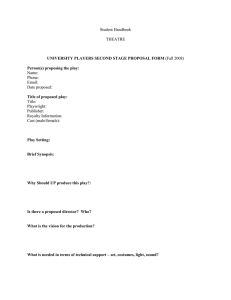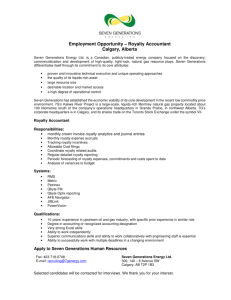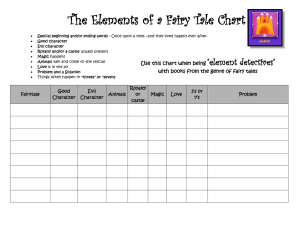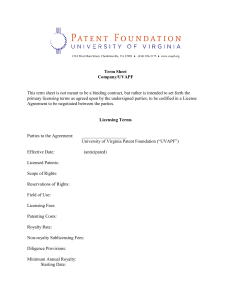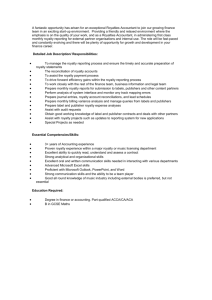Royalty and Fees for Technical Services
advertisement
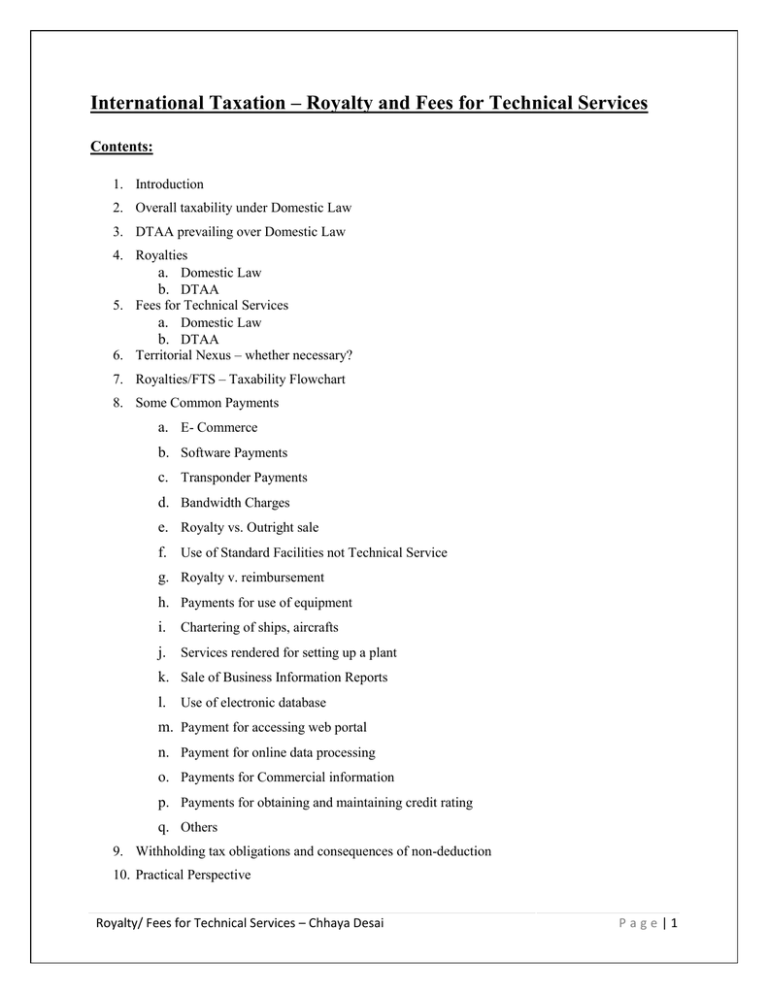
International Taxation – Royalty and Fees for Technical Services Contents: 1. Introduction 2. Overall taxability under Domestic Law 3. DTAA prevailing over Domestic Law 4. Royalties a. Domestic Law b. DTAA 5. Fees for Technical Services a. Domestic Law b. DTAA 6. Territorial Nexus – whether necessary? 7. Royalties/FTS – Taxability Flowchart 8. Some Common Payments a. E- Commerce b. Software Payments c. Transponder Payments d. Bandwidth Charges e. Royalty vs. Outright sale f. Use of Standard Facilities not Technical Service g. Royalty v. reimbursement h. Payments for use of equipment i. Chartering of ships, aircrafts j. Services rendered for setting up a plant k. Sale of Business Information Reports l. Use of electronic database m. Payment for accessing web portal n. Payment for online data processing o. Payments for Commercial information p. Payments for obtaining and maintaining credit rating q. Others 9. Withholding tax obligations and consequences of non-deduction 10. Practical Perspective Royalty/ Fees for Technical Services – Chhaya Desai Page |1 1. Introduction In the changing business environment, cross border transactions are throwing up a variety of issues e.g. characterization of payments in electronic commerce transactions, payments towards software purchases, payments for technical services, payments for royalties, payments for satellite connectivity, existence of a permanent establishment (PE), attribution of profits to the PE, etc. With the opening up of the Indian economy, taxation of Non-residents including foreign companies has increased exponentially. The taxation of non residents is governed by the domestic tax law (Income Tax Act, 1961) and by the Double Taxation Avoidance Agreements that India has entered into with other countries. Internationally, treaties have been negotiated under the UN Model Convention or the OECD Model Convention. India being a developing country has largely followed the UN Model Convention. 2. Overall taxability under Domestic Law As per Section 5 of Income tax Act, Non residents are liable to tax on (a) income received or deemed to be received in India and (b) income which accrues or arises or deemed to accrue or arise in India. Of the income that is included in the total income of a non-resident, the income that is ―deemed to be received in India‖ is restricted to pension scheme or provident fund scheme. There is no confusion surrounding income actually received or accrues or arises in India. The actual controversy arises to income that is deemed to accrue or arise in India, which is covered in Section 9. Nature of Payments From taxability point of view, income falls under three main categories Business Income i.e. incomes earned through a fixed base of business in India Royalty/ Fees for Technical Services – Chhaya Desai Page |2 Technical / Managerial Services i.e. incomes which accrue or deemed to accrue or arise in India Other incomes i.e. interest, dividend etc. Here, we shall cover in brief payments made towards royalty, fees for technical services, fees for included services and e-commerce transactions. Charging Section Section 9 enlists the various incomes that shall be deemed to arise or accrue in India. As per revised Explanation to the Section 9(2), it has to be noted that the moment an income is categorized as royalty or FTS, such income shall be included in the total income of the nonresident, whether or not i) the non-resident has a residence or place of business or business connection in India or ii) the non-resident has rendered services in India. Royalties and fees for technical services are only exceptions to the general rule that only the country of residence will be able to tax business income. 3. DTAA prevailing over Domestic Law Presently a person is entitled to claim application of DTAA if he is ‗liable to tax‘ in the other Contracting State. The payee is entitled to avail benefit as per provisions of relevant DTAA i.e. lower rate or exclusion of service from scope of definition. A typical case is withholding tax on services. Since no surcharge is applicable on DTAA rates, these are generally beneficial. As per Section 90, if a given payment (for example, royalty or FTS) is chargeable under a DTAA as well as under the IT act, then one would have to check the rate of applicable tax under the Indian domestic law and the rate prescribed in the DTAA and lower of the rates would apply. Royalty/ Fees for Technical Services – Chhaya Desai Page |3 4. Royalties a. Domestic Law Domestic Law - Source Rule Royalties taxation under domestic law Royalties Residence State Source State Included in Taxable Income Flat-rate withholding tax Double tax Relief (credit) Section 9(1)(vi) states that income by way of royalty would be taxable in India if payable to the non-resident by any of the following : (a) (b) (c) the a person who is a resident, except a person who is a non-resident, where Government where royalty is payable in respect of the royalty is payable in respect of any or any right, property or information used right, property or information used or or services utilized for the purposes of services utilized for the purposes of a a business or profession carried on by business or profession carried on by such person outside India or for the such person in India or for the purposes purposes of making or earning any of making or earning any income from income from source outside India or source in India or In both sub-clauses (a) and (b) above, the focus is on whether the royalty payment was for the purposes of : a business/profession in India; or Royalty/ Fees for Technical Services – Chhaya Desai Page |4 earning any income from any source in India Once either of these conditions is satisfied, irrespective of whether the payment is done by a resident or a non-resident, the income would be taxable in India for the non-resident assessee. Dictionary meaning of Royalty Generally, royalty is the sum payable for the right to use someone else‘s property/asset for the purpose of gain. CIT vs. Ahmedabad Manufacturing and Calico Printing Co.[1983] 139 ITR 806 (Guj). Domestic Law definition of Royalty Royalty is a sum which is taxable under Explanation 2 in Section 9(1)(vi) of the IT Act, which section further provides that consideration flowing in from the following items shall be deemed to be royalty: - i. the transfer of all or any rights (including the granting of a license) in respect of a patent, invention, model, design, secret formula or process or trade mark or similar property; ii. the imparting of any information concerning the working of, or the use of, a patent, invention, model, design, secret formula or process or trade mark or similar property; iii. the use of any patent, invention, model, design, secret formula or process or trade mark or similar property; iv. the imparting of any information concerning technical, industrial, commercial or scientific knowledge, experience or skill; iva. the use or right to use any industrial, commercial or scientific equipment but not including the amounts referred to in section 44BB; Royalty/ Fees for Technical Services – Chhaya Desai Page |5 v. the transfer of all or any rights (including the granting of a licence) in respect of any copyright, literary, artistic or scientific work including films or video tapes for use in connection with television or tapes for use in connection with radio broadcasting, but not including consideration for the sale, distribution or exhibition of cinematographic films; or vi. the rendering of any services in connection with the activities referred to in sub-clauses (i) to (iv), (iva) and (v) above. Exclusions from the definition of royalty under section 9 However specifically excludes consideration: - which is chargeable to tax under the head ‗capital gains‘ - for sale, distribution or exhibition of cinematographic films Therefore, an essential precondition for determining royalty is that the non-resident owner of such intellectual property should have retained the property in them while allowing the right to use such intellectual property. DTAA with various countries have defined royalty in wider terms to include even consultancy service or any service connected with any technical project. b. DTAA Royalties treaty allocation of taxing rights 5. 6. 7. 8. Residence State Royalties May tax Source State May not tax 9. 10. Included in Taxable Income Royalty/ Fees for Technical Services – Chhaya Desai No tax allowed Page |6 OECD/ UN/ US Model Convention on Article 12 Article 12 of various Model Convention depicts as follows : OECD Model UN Model US Model Royalties arising in a Royalties arising in a Royalties may be taxed in the State of residence Contracting State and Contracting State and of the beneficial owner. beneficially owned by paid to a resident the other a resident of the Other of State Contracting State shall Contracting be taxable only in that may be taxed in that other State. other State. Such royalties may Such royalties may also be taxed by the State in also be taxed by which they have their source, but the tax is Source State, but the limited to 10 percent of the gross amount of the - tax is limited to ___ royalties. % percent of the gross amount of the royalties. Royalty means- Royalty means- Means payments of any kind received as a (a)Any consideration for the use of, or the right consideration for the use of, or the right to to use, any copyright of literary, artistic, use, any copyright of literary, artistic or scientific or other work (incl. scientific work including computer cinematograph software, cinematographic films, audio or video films, (*or films or tapes used for radio or tapes or disks, and other means of image or television broadcasting), any patent, trade sound reproduction), any patent, trademark, mark, design or model, plan, secret formula or design or mode, plan, secret formula or process, process, (*or for the use of, or the right to or other like right or property, or for use, industrial, commercial or scientific information concerning industrial, commercial, equipment) or for information concerning or scientific experience and industrial, commercial or scientific (b) gain derived from the alienation of any experience. Royalty/ Fees for Technical Services – Chhaya Desai property described in (a) above, provided that Page |7 (*bold markings not in OECD model.) such gain is contingent on the productivity, use or disposition of the property. Beneficial owner The above provisions shall not apply if the beneficial owner of the royalties, being a resident of a Contracting State, carries on business in the other Contracting State in which the royalties arise, through a permanent establishment situated therein and the right or property in respect of which the royalties are paid is effectively connected with such permanent establishment. In such case, the provisions of Article 7 shall apply. ‗Beneficial Owner‘ is he who is free to decide: - whether or not the capital or other assets should be used or made available for use by others or - On how the yields there from should be used or - both. Royalties taxation under OECD Model Convention Royalties Residence State Exclusive Taxing Right Source State No Taxing Right In the case of UN Model, the percentage is to be established through bilateral negotiations) of the gross amount of the royalties. The gross amount of the payment would extend to cover the amount of value added tax, if any, included in it. The treaty restriction % of withholding tax is determined by reference to a percentage of the gross amount even in those cases where the State of source, under its domestic law, imposes its tax by way of an assessment of the net amount. Royalty/ Fees for Technical Services – Chhaya Desai Page |8 Differences among model treaties Royalties OECD Model UN Model US Model CARICOM Treaty Exclusive residence state taxation Shared taxation Exclusive residence state taxation Exclusive source state taxation Comparison of definitions: UN MC and the Indian Act include Lease of Equipments. OECD and UN MC does not include ―transfer of all rights in a patent, etc which is contained in ITA, It only includes right to use a patent, etc or copyrights, etc, All the MCs specifically include consideration for use of; or the right to use cinematographic films whereas the Act specifically excludes the same. The definition under OECD is narrow as compared to the UN MC and the Act. The main difference is that OECD model would recommend that royalty is not taxed in the country which uses the technology for which royalty is paid, unless the lender has PE in the borrower‘s country. The recommendation of UN Model enables tax on royalty in both countries, subject to agreement that the rate of tax should be fixed at agreed rate in the borrowing country, from where royalty is payable, by bilateral negotiations. Relevance of Timing and place of accrual It can be argued that royalty is taxable on remittance, but is likely to meet with resistance. Most DTAA for e.g. DTAA between India and Germany clearly understands that royalties and fees for technical service arise on payments, so that the agreement should override the domestic law. Royalty/ Fees for Technical Services – Chhaya Desai Page |9 Any payment by way of royalty or technical fees would be liable to tax under domestic law irrespective of the place, where service is rendered. But where a foreign contractor without any permanent establishment in India prepares a feasibility report and finalizes the same abroad except for short visits for a few days in India, the payment does not accrue in India and is also not liable to tax under S.9(1)(vi) and/or (vii), besides being entitled to relief under Article 12(7)(a) of Indo- US DTAA a shield in Airports Authority of India. 269 ITR 355. Therefore, sovereignty and comity of nations demands that a country cannot go on taxing endlessly every non-resident, however tenuous the tax connection, but rather restrict itself to incomes that have a nexus with the source country. As to accrual of income, a recent decision of the Bombay High Court throws some light on the issue. In Pfizer Corporation v. CIT, the court held that dividend accrues on remittance to the nonresident. On similar grounds, it can be argued that royalty is taxable on remittance. Historical Background and Issues involved Some OECD member states do not impose any tax at all on royalties paid to non-residents (Denmark, Italy, Netherlands, Norway, Switzerland, Italy, etc). The reason for advocating a complete waiver of taxation by the State of Source in favour of unrestricted taxation by the State of residence is that the State of residence has forfeited tax by having had to allow as a deduction the costs of developing the rights, etc. in respect of which the royalties are paid. At the same time, OECD states are attempting to limit the term ‗royalties‘ in favour of business profits (Art. 7), thereby reducing cases of with-holding taxes. Article 12, being a provision dealing with income from the use of assets, takes precedence over Art. 7. However, Art. 12 gives way to Art. 7 if the licensor has a PE in the state in which royalties arise and the royalties are part of the profits of that PE. Article 12 deals only with royalties „arising‟ in a contracting state. It fails to provide a treaty definition of the term ‗arising‘ (i.e. of ‗source) in connection with royalties. Hence, royalties arising in a third state will not be covered under this Article. 5. Fees for Technical Services Royalty/ Fees for Technical Services – Chhaya Desai P a g e | 10 a. Domestic Law Source Rule Section 9(1)(vii) states that income by way of FTS would be taxable in India if payable to the non-resident by any of the following : (a) (b) (c) the a person who is a resident, except a person who is a non-resident, where Government where the fees are payable in respect of the fees are payable in respect of or services utilized for the purposes of a services utilized for the purposes of a business or profession carried on by business or profession carried on by such person outside India or for the such person in India or for the purposes purposes of making or earning any of making or earning any income from income from source outside India or source in India or In both sub-clauses (a) and (b) above, the focus is on whether the royalty payment was for the purposes of: a business/profession in Indi; or earning any income from any source in India or services are utilized in India Once either of these conditions is satisfied, irrespective of whether the payment is done by a resident or a non-resident, the income would be taxable in India for the non-resident assessee. Also, irrespective of place of rendering of services, if utilized in India, shall be taxable in India. In ordinary words, technical service is the fee paid in connection with the assistance of a technical nature, as for erection of a plant, supervision of its performance, etc. The Term is defined under Explanation 2 to Section 9(1)(vii) of the Act in an exhaustive manner - Widely defined to mean consideration for rendering any managerial, technical or consultancy services (including the provision of services of technical or other personnel) Royalty/ Fees for Technical Services – Chhaya Desai P a g e | 11 - Excludes consideration for construction, assembly, mining or like project undertaken by the recipient or consideration which is chargeable under the head ‗salaries‘ in the hands of the recipient. b. DTAA There is no separate Article in OECD Model and UN Model for technical fees. However, the same is defined in US Model Convention. FTS normally forms part of ‗business profits‘ Article (Article 7). The concept of FTS emerged due to the developing nations like India and China were harping upon the source rule of taxation as they did not want to give away with a tax pie for the technical fees arising in their countries. The terms ‗managerial, ‗technical‘ and ‗consultancy‘ have not been defined in the IT Act. ‗Technical services‘ is a term of wide connotation and includes a range of services involving technical knowledge, assistance in technical operations, maintenance and other support in respect of technical matters. It must be broadly construed to include any kind of service given by someone who is an expert in any subject such that various types of ―professional services‖ would also be included within the scope. ‗Consultancy services‘ are also technical in nature and advisory services merely involving discussions and advice of routine nature or exchange of information will not amount to consultancy services. ‗Managerial services‘ as per the dictionary means ―of or relating to the function or responsibility or activity of management.‖ However, no Indian cases have interpreted this term so far. There is no Article on FTS in few Indian treaties - UAE, Indonesia, Sri Lanka, Nepal, etc. It is defined similarly as ITA except for the exclusion. Also, consideration for FTS through technical or other personnel is not found in few treaties. ―Managerial‖ services are not found in few treaties. Royalty/ Fees for Technical Services – Chhaya Desai P a g e | 12 Exclusion of Teaching in or services by Educational institutions is found in few treaties. Technical fees and royalty may be indistinguishable. The concept of beneficial owner as mentioned in Royalty is similarly applicable to Fees for Technical Services. In most treaties, FTS is defined similarly as domestic law except for few exclusions such as USA, Netherlands, etc. FEES FOR INCLUDED SERVICES: “Make available” The definition of Fees for included Services as per India USA tax treaty Article 12(4) is as follows:12(4)(a) - Similar to Sec.9(1)(vi) 12(4)(b) - Payment of any kind to any person in consideration for the rendering of any ―technical or consultancy‖ services including through the provision of services of technical or other personnel if such services: make available technical knowledge, experience, skill, know-how, or processes or consist of the development and transfer of a technical plan or technical design . Exclusions as per Article12(5): Amounts paid for/to Services linked to the sale of property, shipping, teaching, personal or professional service. MOU of the India USA Tax Treaty: – Technology will be considered "made available" when the person acquiring the service is enabled to apply the technology – Provision of requiring technical input by the person providing the service does not per se mean that technical knowledge, skills, etc., are made available Royalty/ Fees for Technical Services – Chhaya Desai P a g e | 13 – Use of a product which embodies technology shall not per se be considered to make the technology available If the services do not ―make available‖ technical knowledge, etc., then, they are outside the ambit of FIS Article and not taxable. The ITAT in Raymond Ltd vs. DCIT (2003) 86 ITD 791 (Mum) has held that despite the absence of US treaty like MOU to the UK Treaty, the words ―make available‖ are to be read with the same meaning in the UK Treaty also. Updates on “Make Available” Services not regarded as “make available” Services of preparing material safety data sheets in EU format which contained information required as per EU regulations [Nocil v. DCIT 96 TTJ 765 (Mum)] Strategy consultancy services such as marketing and sales strategy, business strategy and portfolio strategy [DCIT v. Boston Consulting Group Pte Ltd 93 TTJ 293 (Mum)] Repair of software [In re. Airports Authority of India 273 ITR 437 (AAR)] Surveillance for the purpose of ISO certification [NQA Quality Systems Registrar Ltd. v. DCIT 92 TTJ 946 (Del)] Services regarded as “make available” Providing technical plan, design and information to enable recipient to execute and install the water features [Gentex Merchants (P) Ltd. 94 ITD 211 (Kol)] Technical assistance to enable recipient to design, construct and operate a plant to manufacture aluminum and training for application of technical knowhow [Hindalco Industries Ltd. v. ACIT 94 ITD 242 (Mum)] Royalty/ Fees for Technical Services – Chhaya Desai P a g e | 14 Preparing a bankable project report with complete details and vetting a project report to enable the service recipient to raise a foreign loan for its project [ITO v. Sinar Mas Pulp & Paper (India) Ltd. 85 TTJ 794 (Del)] 6. Territorial Nexus – whether necessary Royalty / FTS income is taxable in India if service is used / utilized in India. Place of rendering service not relevant Earlier, the SC in Ishikawajima-Harima Heavy Industries‘ case (288 ITR 408) case held that Offshore services to be regarded as accruing in India• if rendered in India as well as used in India However, with the introduction of Explanation to section 9 vide Finance Act 2007 w.r.e.f. 01/06/1976, there will be no need to establish any territorial nexus between the income deemed to accrue or arise to the non-resident under the said clauses and the territory of India. The draft Direct Taxes Code seeks to tax technical services rendered to an Indian resident even if the services are not rendered in India. 7. Royalties/ FTS (Taxability Flowchart) Royalty/ Fees for Technical Services – Chhaya Desai P a g e | 15 Royalties and fees for technical services arise from commercialization of intellectual property rights. The tax authorities are interested in classifying as much incomes as possible as royalties, because a fixed tax is imposed on royalties and fees for technical services; and assessees are interested in avoiding such classification since that which is not classified as royalty or fees for technical services is business income, which is taxed at a very low or nil rate. This divergence of interests is the cause of much litigation. In the case of Bharti Axa General Insurance Co Ltd In re, Aug 6, 2010 (AAR), payments made by Indian Insurance company to Singapore company for providing access to applications and to server hardware system hosted in Singapore and for receiving assistance such as business support, marketing information, technology support services, etc is neither in nature of ‗royalty‘ nor ‗FTS‘ as there is no transfer of any copyright nor rendering of any technical service. Royalty/ Fees for Technical Services – Chhaya Desai P a g e | 16 8. Some Common Payments a. E- Commerce Different countries have different laws by which such patents and copyrights are protected but then the rapid development of technology has meant that various kinds of new rights, which did not fall within the narrow definitions had arisen as in respect of telecasting rights through use of satellites and such other rights. Development of computers with software technology is another area which has widened the vista of intellectual property rights. Internet trading and unloading from internet are new developments, both for domestic law and treaty law. When services are routed through intermediaries it becomes difficult to trace transactions at various stages, till such time as the law regarding e-commerce becomes stable. So far as trading is concerned where they relate to mere purchase of goods from a foreign country which does not have a permanent establishment, there is no liability towards Indian income tax, since the purchases are at arm‘s length. But where they relate to services, the question will arise as to the head under which they are to be taxed, whether under royalty or technical fees. The second proviso to section 9(vi) exempts income by way of royalty consisting of a lump sum payment made by resident for the transfer of rights in computer software supplied by a nonresident. Controversy essentially around whether such transactions fall within the ambit of ‗royalty‘ or ‗business profits‘. OECD-TAG report (2001) It is important to keep in mind that mere use of technology for rendering services should not result into treatment of such services as technical services and consequently income arising from such use of technology cannot be characterized as ‗fees for technical services‘. It would be relevant here to distinguish between provision of services and provision of know-how. The TAG of OECD noted the foll, to be key elements while identifying know-how and provision of services respectively: – Taxability of a transaction should not be colored by the mere fact that it is effected electronically Royalty/ Fees for Technical Services – Chhaya Desai P a g e | 17 – E-commerce transactions essentially involving payment for use of copyright to be regarded as royalty; if payment essentially for copyrighted article, then, income to fall within the ambit of ‗business profits‘ – Know how is ‗undivulged‘ technical information that is necessary for the industrial reproduction of a product or process, directly and under the same conditions in as much as it is derived from experience; – In the know-how contract, one of the parties agrees to impart to the other, his special knowledge and experience which remain unrevealed to the public, so that the other can use them for his own account. – In the know-how contract the grantor is not required to play any part himself in the application of the formula and does not guarantee the results thereof. – Provision of know how must be distinguished from the provision of services, in which one of the parties undertakes to use the customary skills of his calling to execute work himself for other party Hence it is essential that the existing definition of FTS should be amended to keep pace with time and mere use of technology for rendering services should not be treated as technical services. Similarly, the scope of the definition of FTS should be narrowed down to include only those services, which make available any technical know-how, skill, knowledge, etc. High Power Committee Report (2001) While HPC has expressed conformity with OECD principles, it has changed characterization where the mode of delivery is digital; certain HPC characterization is in conflict with OECD Commentary and accepted principles on Article 12. The HPC, in its Report has stated that there is no need to define e-commerce for the purposes of ITA. It has accepted the principle of neutrality, which signifies tax equity between ecommerce and commerce through traditional means and remarked that there is no need to exempt ecommerce transactions from taxation. The HPC is of the view that e-commerce leads to anonymity of the source party, evasion of tax and difficulty in recovery of taxes due to the virtual nature of the transactions According to the HPC, this ‗base erosion‘ approach offers a possible solution for equitable tax sharing between residence and source countries provided. Royalty/ Fees for Technical Services – Chhaya Desai P a g e | 18 As reflected in the explosive expansion of India‘s software export producing industry, the valueadd activities of an e-commerce business will generally involve substantial investments of research and development, significant amounts of individual labour and creativity, and the initiative, skill, and entrepreneurial endeavours of those individuals who can create the intellectual capital of an e-commerce business. These are precisely the value-added resources that India‘s technologically advanced and English-speaking workforce has in ample supply. Taxability of various types of e-commerce transactions as per HPC, ITA and OECD TAG Committee is as follows: Type of Payment HPC ITA TAG Committee Royalty Royalty Business profits Royalty Royalty Royalty Royalty Royalty Business profits contracts, ASP license fees Royalty Royalty Business profits Application Service Provider ("ASP") Royalty Royalty Business profits Software maintenance FTS FTS Business profits site access, Online shopping portals, Online Business Business auctions, Web based broadcasting profits profits Electronic ordering and downloading of digital products, Updates/ Add -ons, Web site hosting Electronic ordering and downloading of digital products for purposes of copyright exploitation Limited duration software and other digital information licenses, Single-use software or other digital product, Application hosting- separate license/ Bundled Data retrieval, Information delivery, Advertising, subscription base interactive web Business Business profits Business profits/ Electronic access to professional advice profits FTS FTS Technical Information, Content acquisition Royalty Royalty Royalty Royalty/ Fees for Technical Services – Chhaya Desai P a g e | 19 Taxation on Cloud computing Cloud computing is a relatively new phenomenon and hence it has not yet been tested by Courts nor it is common for scrutiny assessments. However certain issues like income characterization and Permanent Establishments may be identified from an Indian Tax perspective. After a broad analysis of the royalty definition as per the IT Act and several tax treaties signed by India, it can be considered that most of the cloud computing models are covered by it. For example, if the client is entitled to exercise sufficient control over the cloud server or any part of its functionality, it may be viewed as the use of scientific equipment and the consideration would be treated as royalty income. Also if there is a transfer of right to use certain IP rights such as the copyrights in certain software stored on the cloud server which may be commercially exploited by the client, it would be covered by the definition of royalty. For example, in the case of Cargo Community Network Pte. Ltd, AR-2007-7, the payment made by an Indian subscriber to a Singapore service provider for providing access to a portal hosted from Singapore was considered as royalty income as the portal allowed access to a number of value added data processing and information services rendered by the Singapore based server and the client in a way secured the right to use this scientific equipment. However, it is difficult to reach at any concrete conclusion on the appropriate tax treatment of new business models like cloud computing involving multiple features or transactions as it can be argued that certain types of services may fall under fees for technical services. The issue regarding whether a server would be viewed as PE of the client depends on the type of control that the client may exercise. In such a case profits earned by the client that is attributable to the services may end up being taxed in the country where the server is located. Royalty/ Fees for Technical Services – Chhaya Desai P a g e | 20 b. Software Payments OECD Model Commentary on Article 12 on taxability of Software payments The Taxability of software related transactions poses unique challenges in view of the manner in which software is licensed and distributed. The Taxability depends upon nature of right granted or transferred. OECD Commentary suggests the following: Alienation of partial right: for example, A owns a copyright in a software which he licenses to B (say, for a particular area) and allows B to make copies and distribute; payment by B to A taxable as royalty. Alienation of limited user rights: for example, A owns a copyright in a software and grants B user rights only for that copyrighted software (this could include limited reproduction rights such as enabling B to copy the software on his computer or limited user rights whereby enabling B to copy the software amongst various users in its organization); payment by B to A taxable as business income. Payments made for right acquired in relation to copyright limited to those necessary to enable the user operate the program i.e. if it is an acquisition of a copyrighted article, the payment is not ‗Royalty‘ but taxable as business profits. In a case where the programmer also supplies information about ideas & principles underlying the program, such as logic, algorithms or programming languages or techniques, the payments made shall be ‗Royalty‘ to the extent they represent consideration for use of or the right to use, secret formulas or special information. Types of Software transfer: (A) Canned Software / shrink wrapped software Off-the-shelf or packaged software available to all the customers in the same form without any customization e.g. Microsoft office. It is license to use copyrighted article and not copyright. Transaction treated as sales, not royalty. Taxable as business profits Royalty/ Fees for Technical Services – Chhaya Desai P a g e | 21 Distinction between ‗copyright rights‘ and ‗program copy‘ In this connection, it is helpful to take note of the distinction made between ‗copyright rights‘ and ‗program copy‘ made by OECD. Thus, reading S. 14 of the Copyright Act along with the OECD commentary makes it clear that copyright rights for which royalty would be payable does not get paid for by the purchase of an article which has copyright embedded in it, and thus royalty need not be paid for purchase of such articles. In the case of CIT v. HEG Ltd., the High Court held that merely because subscribing to a journal which gave information on a particular industry was commercial in nature would not make it a thing for which royalty would be payable. Some sort of expertise or skill was required. So, in the absence of such skill in the journal, payments made to it would not be royalty. The payments should be like rentals, with ownership remaining in the nonresident; the consideration received should be something which is an intellectual property under any of the applicable acts like the Copyright Act, 1957, the Trade Marks Act, 1999, or the Patents Act, 1970 or know how and there should be transfer of ‗copyright right‘ to modify or commercially exploit the property. Sonata Software Ltd. v. ITO (International Taxation) (106 TTJ 797) Samsung Electronics Co. Ltd. vs. ITO (93 TTJ 658) Hewlett-Packard (India) (P) Ltd v ITO 5 SOT 660 (Bang) Motorola, Ericson and Nokia 96 TTJ 1 (Del SB) However, in a recent decision of Delhi Tribunal‟s ruling in the case of Microsoft (2010-TII-141-ITAT-DEL-INTL) has ruled against the settled principle of Tribunals across the nation concluding that sale of shrink wrapped software is to be characterized as Royalties and not business income. It stated that Microsoft product is ‗licensed and not sold‘ The KHC in a recent ruling ruled that payment for royalty for shrink-wrapped software would tantamount to an income taxable in India which is taxable under Section 9 of the Income-Tax Act 1961 and hence will treated as royalty. Royalty/ Fees for Technical Services – Chhaya Desai P a g e | 22 (B) Embedded Software Embedded software is ‗built-in‘ to hardware it is supplied with Generally no separate value is allocable towards software The purchaser of the computer acquires a copyrighted article and not right to use any copyright in embedded software. Copyright remains with the owner of the software and the same is not transferred or licensed to the purchaser Accordingly, payment not royalty Case laws: (i) Lucent Technologies Hindustan Ltd. v. ITO (92 ITD 366) (ii) Motorola, Ericson and Nokia 96 TTJ 1 (Del SB) Typical facts: supply of integrated equipment comprising hardware and software where the supply of software is inextricably linked to supply of the hardware and, both, the hardware and the software, cannot function without each other. Whether payment for software embedded in hardware and supplied along with hardware can be regarded as royalty? • Revenue authorities should not split the transaction to separately tax the payment for software • Further, purchase of software is akin to purchase of a copyrighted article and not purchase of any rights in the software. (C) Customized off-the-shelf software An off-the-shelf software modified and customized according to needs of the customer e.g. customization of ERP software, say SAP No new software is developed but an already marketable software is mapped according to the specified needs of the customer Copyright owner retains copyright in the software. Right to copy the software generally not granted to end user Degree of customization is relevant. o If high then it is Fees for Technical services. o If negligible then it is neither royalty nor fees for technical services. Royalty/ Fees for Technical Services – Chhaya Desai P a g e | 23 (D) Software Development Specifically coded/developed for a specific user and for a specific purpose as per the requirements e.g. specialized billing software for a company, inventory software, etc. Generally rights in copyright of software are with the customer Generally, all the rights in the software are transferred to the user and no rights are retained by the programmer Payment for customized software falls within the ambit of ‗fees for technical services‘. This is not royalty. Payment to a software house for supply of algorithms, programming logic may be characterized as royalty to the extent they relate to payment for use of secret formulas for information concerning scientific experience Payment for use of software through Internet IMT Labs India (P) Ltd v. CIT 287 ITR 450 (AAR) Taxability of payment for use of licensed software on the Internet – Payment described as ―royalty‖; contingent on number of sessions for which the software is used – Non-resident to provide limited technical support – Software held to be ―scientific equipment‖ under the Act and India US Tax Treaty; provision of technical support held to be ancillary to use of software – Payment regarded as ―royalty‖ Some typical software transactions Foreign software supplier sends soft copies of software (on floppies /CDs) to local distributor for onward distribution to customers (shrink wrap software) Foreign software supplier grants copyright right to local distributor to make copies of software and distribute them to customers Royalty/ Fees for Technical Services – Chhaya Desai P a g e | 24 Foreign software supplier customizes the software as specified by Indian buyer Payments for ERP software – business income or royalty income? c. Transponder Payments Whether payments by broadcasting companies to satellite operating companies for use of transponder to beam signals falls within the ambit of ―royalty‖? Payment by a non-resident to another for use of transponder to beam channels telecasted in India held to be consideration for use of ―process‖, chargeable to tax as royalty under section 9(1)(vi) of the Act Asia Satellite Telecommunications v. DCIT 85 ITD 478 (Del) Facts similar to AsiaSat‘s case above; the word ―process‖ in the India US Tax Treaty qualified by ―secret‖ and hence should be interpreted narrowly as compared to the Act; payment held not to be for any ―secret process‖ but for a service/facility; held not to be taxable as royalty/FIS PanAmSat International Systems v. DCIT 103 TTJ 861 (Del) Payments for use of transponder held not to constitute ―royalty‖/FTS for the following reasons: – Definition of ―royalty‖ under the Act for the relevant year was restrictive and did not include payment for use of equipment – Transponder was per se not owned by the recipient – No service, whether technical or otherwise is being rendered by the recipient ITO v. Raj Television Network Limited ITA Nos 1827 & 1828 (MDS/1998) Royalty/ Fees for Technical Services – Chhaya Desai P a g e | 25 d. Bandwidth Charges Whether payment for leased lines, bandwidth charges, etc fall with the ambit of royalty? View suggested by the OECD: chargeable as ‗business profits‘ – confirmed by judicial authorities in India Payment held to constitute provision of standard facilities by service providers and not payment for use of process/fees for technical services Software Technology Parks of India v. ITO 3 SOT 529 (Blr) Wipro Ltd v. ITO 80 TTJ 191 (Blr) DCIT v. Infosys Technologies Ltd. e. Royalty vs. Outright sale In CIT v. Davy Ashmore India Ltd., the assessee made payments to a foreign entity in consideration for outright sale of designs and drawings, which payments were sought to be taxed by the ITO as royalty under S. 9(1)(vi) of the IT Act. The Court rejected the ITO‘s contention and held that when there was an outright sale, the consideration could not be referred to as royalty. Issue specially relevant in the context of manufacturing companies and real estate developers Arguably, payment for outright purchase of designs and drawings may be outside the ambit of royalty/FTS: Payment not for ‗use of‘ designs and drawings Payment not for ‗services‘ Transaction akin to purchase of goods Additional protection under certain tax treaties with FIS clause: services rendered, if any, are inextricably and essentially linked to sale of property Royalty/ Fees for Technical Services – Chhaya Desai P a g e | 26 f. Use of Standard Facilities not Technical Service Many times we come across instances of service which employ technology as well as intellectual property rights like copyrights, patents and secret processes and know-how. In Skycell Communications Ltd. v. DCIT, the assessee was a mobile network service operator, and the tax authorities claimed that technical service was involved. The Court held that mere collection of a fee for use of a standard facility provided to all those willing to pay for it does not amount to the fee having been received for technical services. In Wipro Ltd. v. ITO, the issue was whether subscription to a database of business information would constitute payment for technical services. The Court observed that installation and operation of sophisticated equipment with a view to earn income by allowing customers to avail of the benefit of the use of such equipment does not result in provision of any technical service. In Diamond Services International, the assessee was a diamond testing institute which was engaged in the grading of diamonds. The Court held that though undoubtedly the institute was using its experience in grading the diamonds, such grading could not be said to have transferred its experience, knowledge or skill to the customer, therefore the transactions cannot be labelled fee for technical services. g. Royalty v. reimbursement Very often one comes across agreements in connection with royalties and fees for technical services wherein a resident agrees to pay contractual consideration to a non-resident. The consideration consists of two parts, one part is for royalties or technical services on which the resident is obliged to withhold tax, and the other part is claimed to be non-taxable in the hands of the nonresident recipient on grounds of being mere reimbursement of expenditure incurred by the nonresident, hence not liable to taxation. Here it is to be checked, whether the contract could still have stood if hypothetically the contract were to be split, and the reimbursement ignored—if Royalty/ Fees for Technical Services – Chhaya Desai P a g e | 27 it can, then the sums can be subject to different tax treatment, otherwise not. Sultan Brothers v. CIT (SC). h. Payments for use of equipment Prior to the amendment to the definition of the term ―royalty‖ under the Act, payment for use of equipment was outside the ambit of ―royalty‖ Payment for use of equipment still outside the ambit of ―royalty‖ under India‘s tax treaties with: Greece, Israel and Sweden, Belgium, France, Kazakhstan, Netherlands and Spain (by virtue of restrictive MFN clause) If the assessee is in the business of providing equipment on hire, then, equipment rentals not subject to tax in India if the recipient does not have a PE in India i. Chartering of ships, aircrafts Poompuhar Shipping Corporation Ltd v. ITO 108 TTJ 970: payment for time charter (wet lease) regarded as royalty Certain tax treaties such as treaties with US, Canada, Singapore specifically exclude rentals for ships and aircraft from the scope of ―royalty‖ International treatment: Characterization of payment, arguably, contingent on the nature of charter viz. dry lease or wet lease – Dry lease: generally regarded as payment for ―use of equipment‖ and hence, royalty – Wet lease: generally regarded as profit from shipping activity and hence, covered by Article 8 Recent decisions of the Chennai Tribunal: – West Asia Maritime Ltd v. ITO 109 TTJ 617: payment for bareboat charter demise (dry lease) regarded as royalty Royalty/ Fees for Technical Services – Chhaya Desai P a g e | 28 j. Services rendered for setting up a plant Jindal Tractabel Power Co Ltd v. DCIT 106 TTJ 1011 (Blr) Turnkey arrangement with Raytheon-Ebasco for setting up power plant Consideration segregated between supply of equipment and spares, technical services and start-up services/turnkey responsibility As regards technical services and start-up services, the Tribunal held: Consideration does not fall within the ambit of exclusion from FTS under the Act (consideration for construction, assembly, mining or like project) Rendering of services not inextricably linked to supply of equipment (which equipment supplier Raytheon-Ebasco had to chose) Services relate not only to supply of equipment but also extend to setting up of the power plant Services involve making available technical knowledge, experience, know-how, processes Services fall within the ambit of FIS under the India US Tax Treaty k. Sale of Business Information Reports Dun & Bradstreet Espana S.A. 272 ITR 99 (AAR) and In re. ABC Ltd 284 ITR 1 (AAR) Taxability of payments for standardized ‗Business Information Reports‘ publicly available on the Internet upon payment of subscription charges Such reports typically provide factual information about a company such as location, existence, operation, financial condition, pending litigation, etc along with rating of the company Even though such reports are copyright protected, payments for purchase of such reports are akin to payments for copyrighted article and not constituting ―royalty‖ Royalty/ Fees for Technical Services – Chhaya Desai P a g e | 29 l. Use of electronic database Wipro Ltd v. ITO 94 ITD 9 (Blr) & DCIT v. Infosys Technologies Ltd. Payment for use of a copyright article Even if payment for use of a copyright, then, copyright is not literary, artistic or scientific work Payment is not for information concerning industrial, commercial or scientific experience (which has to be recipient‘s own experience) Payment held not to fall within the ambit of royalty m. Payment for accessing web portal In re. Cargo Community Network Pte Ltd 289 ITR 355(AAR) Nonresident maintaining air cargo portal in Singapore which enables a user to access data on flight schedules, availability of cargo space, etc. and book cargo Subscription charges collected by non-resident which comprise monthly subscription fees, training fees and help desk charges Portal held to constitute ―scientific equipment‖ under the Act and India Singapore Tax Treaty; provision of technical support held to be ancillary to use of software Payment regarded as ―royalty‖ n. Payment for online data processing Kotak Mahindra Primus Ltd. v. DDIT 105 TTJ 578 (Mum) Non-resident maintaining a server in Australia and engaged in data processing Steps involved (i) input of data by the customer through telecommunication links (ii) online processing by the non-resident using software and (iii) output processed data transmitted back to Indian company Royalty/ Fees for Technical Services – Chhaya Desai P a g e | 30 Server in Australia in the control of the non-resident; no control of or physical access to the server granted to the customer Payment held to be outside the ambit of royalty (including payment held not for use of or right to use the server) o. Payments for Commercial information Royalty typically includes payment for information concerning commercial experience Taxability depends on nature and manner of commercial experience or information provided Merely because information provided has commercial value would not tantamount to the payment being regarded as ―royalty‖ In CIT v. HEG Ltd 263 ITR 230 (MP) payment to a non-resident for supply of an industry specific book on monthly basis, country wise data on quantities, prices, imports, exports, etc. was held to be outside the ambit of royalty p. Payments for obtaining and maintaining credit rating Divergent views expressed Credit rating certificate held to constitute ―commercial information‖ and thus, royalty in Essar Oil Ltd v. JCIT 102 TTJ 270 (Mum) Held to be professional services and not royalty in Hindalco Industries Ltd v. ITO 96 TTJ 1009 (Mum) q. Others Imparting of information and Technical knowhow which could be used on a potentially infinite time period has been treated as a capital asset in Scientific Engineering House P. Ltd v. CIT (1986) 157 ITR 86. In such a case, the payment would be taxable if the other criterion in Section 9(1)(vi) us satisfied – the transfer of a capital asset situated in India. Also a lump sum payment without technology being transferred for supply of technical know how does not amount to royalty. ITO v. Sriram Bearings Ltd. (1997) 224 ITR 724 (SC) Royalty/ Fees for Technical Services – Chhaya Desai P a g e | 31 9. Withholding tax obligations and consequences of non-deduction Withholding tax on royalties and fees for technical services are taxed on a flat rate basis, in total disregard of the actual expenditure incurred by the non-resident Guiding Section (Section 195) As regards transfer of payment to a nonresident in consideration of royalty or technical services received, Section 195 of the IT Act provides thatAny person responsible for paying to a non resident including a foreign company any sum (other than interest on securities and dividends) which is chargeable to tax in India is required to deduct tax at source on such income at the time of payment. Provisions of Double Taxation Avoidance Agreement (DTAA) overrule domestic tax laws of contracting states. Difference may arise on account of Tax Rates and Scope of Taxability. 10. Practical Perspective Grossing Up Generally, technology agreements are net of tax and therefore payer who is making payment for tds, therefore becomes it becomes a problem for payer whether to deduct tax or not. Issues faced by payer Royalty and technical fees need not present much problems for the lender of technology as it is for the borrower, because it is the borrower who usually undertakes to reimburse Indian tax of nonresident lenders liability. Treaty Shopping There is a growing practice amongst certain entities who are not residents of either of the two Contracting States, of trying to access the beneficial provisions of the DTAAs and indulge in what is popularly known as ‗Treaty Shopping‘. Royalty/ Fees for Technical Services – Chhaya Desai P a g e | 32 Consequences of Non Compliance The residents responsible for payments of royalties claim the said payments as expenditure in its tax returns, for instance under Sections 35AB or 37. But the Section 40 of the IT Act mandates that no deductions can be made in respect of royalties or FTS or any other sum payable outside India, or in India, to a foreign company or a non-resident (not being a company) , unless the tax is deducted and paid at source (by the resident Indian company) under the Chapter XVIIB of the IT Act. Under the existing dispensation a statement of deduction of tax from interest, dividends or any other sum payable to a non-resident is to be submitted to the tax Department in Form No. 27 quarterly. This form is to be submitted by the person deducting the tax at source. Failure to comply with this provision may result in disallowance of the expenditure, interest on the taxes and penal action Concluding remarks India is slowly moving from ―technology importing‖ nation to ―technology exporting‖ nation Need to align definitions, scope and interpretations of royalty/FTS to this shift Need to align with views and positions accepted internationally Need to clarify position & bring greater certainty on issues such as: Source rule regarding accrual of royalty/FTS payable to a non-resident Meaning to be ascribed to ―make available‖ Tax treatment of Software & e-commerce transactions Methodology to tackle evolving transactions such as payments for transponders, purchase of content, etc. Royalty/ Fees for Technical Services – Chhaya Desai P a g e | 33 The question that arises is that there is no universal rule for deciding the break up of tax pie amongst the source and residence countries due to which it becomes difficult to decide a fair allocation of taxing rights amongst these countries. Historically, it can be argued that the treaty taxing rights did not emerge from economic principles but from the negotiations that took place in the19th century. It took into account the considerations that arose from the territorial limitations to the countries capacity to verify, determine and collect tax. The current treaty rules do not have special rules for e-commerce. Royalty/ Fees for Technical Services – Chhaya Desai P a g e | 34

